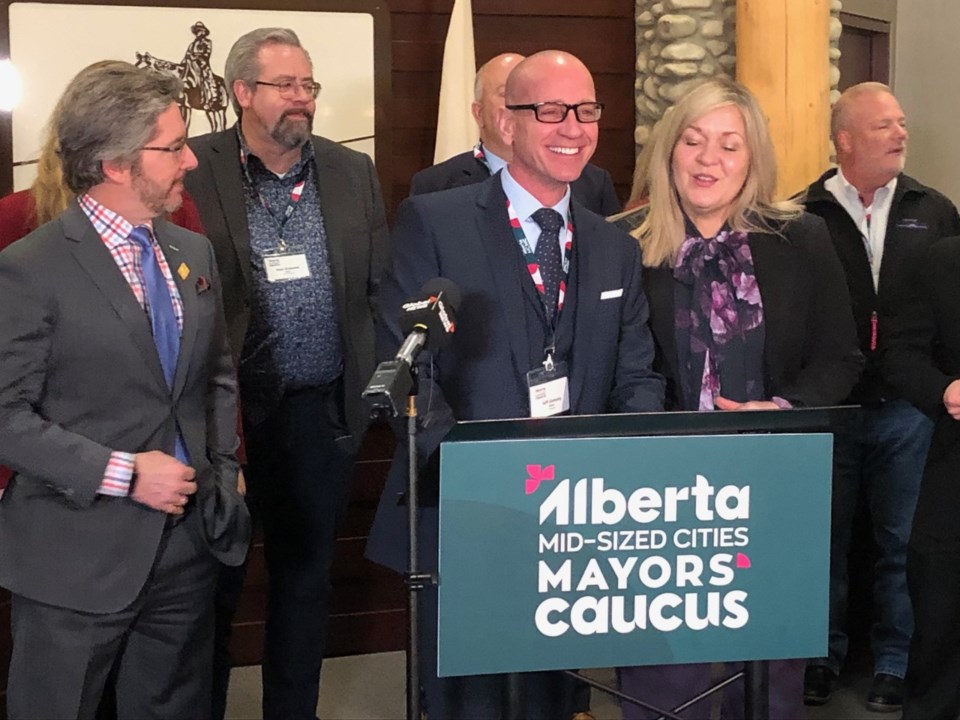Cochrane hosted the Alberta Mid-Sized Cities Mayors’ caucus (MCMC) meeting with Premier Danielle Smith on March 22 at the RancheHouse, in the first of three meetings with provincial party leaders as they prepare for a spring election.
The chair of the MCMC, Cochrane mayor Jeff Genung, said the meeting was productive and critical to the province’s mid-sized cities, and the timing was right.
“With the provincial election coming in May we felt it was in our best interests to get our messages out to provincial leaders while they are vying for the attention of Albertans,” Genung said.
“The Alberta Mid-Sized Cities Mayors’ Caucus values the opportunity to continue to build a collaborative partnership with the leaders of our province.”
The Alberta MCMC is comprised of 24 municipalities, 35 provincial constituencies, and represents nearly one million Albertans. Collectively, the caucus develops strategies to respond to matters of mutual concern and advocates for the needs of Alberta’s mid-sized municipalities. In alignment with the MCMC priorities, on Wednesday, the mayors posed a series of questions specific to affordable housing and homelessness, public safety, emergency medical services, dedicated and transparent provincial funding, and ongoing engagement between the province and the caucus.
“Our mid-sized communities experience many of the same challenges as the larger cities; however, we do not have access to the same supports like funding, services and resources,” Genung said. “We believe a partnership between the province and the mid-sized cities would allow us to collaborate to find ways to can equitably benefit the other million Albertans living in our communities.”
The MCMC is seeking to develop its own charter with the province, which would achieve a more level playing field with the cities of Edmonton and Calgary in terms of how and when funding flows from the province for things like infrastructure.
While the province allocated some funding for operational challenges in the 2023 budget, when it comes to capital funding for infrastructure, the mid-sized cities are still waiting for better news. The Local Government Fiscal Framework Act (known as the LGFF) establishes a framework for providing infrastructure funding to all Alberta municipalities beginning in 2024-25.
However, though Genung and the other mayors were mostly positive about Wednesday’s meeting, it was clearly not all roses and sunshine on every issue for all the mayors.
Mayor Rod Frank of Strathcona County was quick to step up to the microphone in the news conference following the meeting, to respond to what the recent provincial budget meant for the mid-sized cities’ capital funding shortfalls.
“The LGFF was increased but it’s only for one year and it’s only on the operating side. The much larger side is the capital side,” Franks said.
When asked if that issue came up in the meeting, and what the premier’s reaction was, Frank said, “It sure did. It’s election time, so . . .”
He added, “I think the premier understands that we do have a lot of responsibility here that we’re not being funded for.”
Under the current LGFF formula, the annual capital funding for municipalities will rise or fall by the same percentage as provincial revenues from three years prior.
Projections show the Town of Cochrane’s current capital reserves will be used up by 2028. Projects scheduled for the next three years will cost $86 million; over the next 10 years, that cost will be $344 million.
Cochrane will receive the same as last year, and the lowest amount since 2010. In that time period, the town’s population has doubled.
Airdrie’s scheduled 2023-24 allotment is the lowest since 2011. In that time period, the city has grown by over 30,000 people.
Emergency Medical Services (EMS) was addressed by Smith in her opening remarks.
Lloydminster’s mayor Gerald Aalbers said largely due to geography, his community faces longer wait times than most of the province to get patients to a hospital in Edmonton, so EMS is a critical issue in his community. He said he was encouraged to hear the premier’s outline of the recently-announced target of a maximum 45-minute wait for ambulances to drop patients off before leaving emergency rooms.
“There’s still more work to do and we’ll certainly pressure the government, and the government that’s elected in May, to deal with EMS. It’s critical, and I think she got the message,” Aalbers said.
Aalbers added he has a unique challenge among Alberta’s mayors, representing a city that straddles two provinces, and that the same EMS challenges exist on both sides of the border.
On March 23 and 24 the MCMC hosted the leader of the Official Opposition Party Rachel Notley and leader of the Alberta Party Barry Morishita, respectively.




